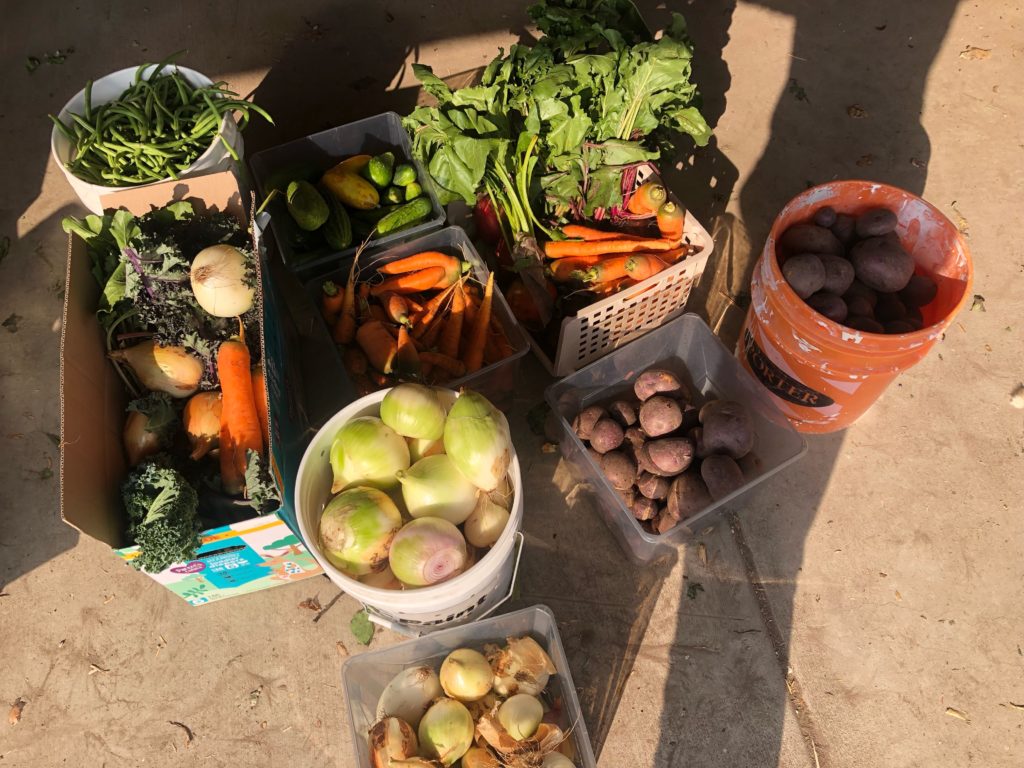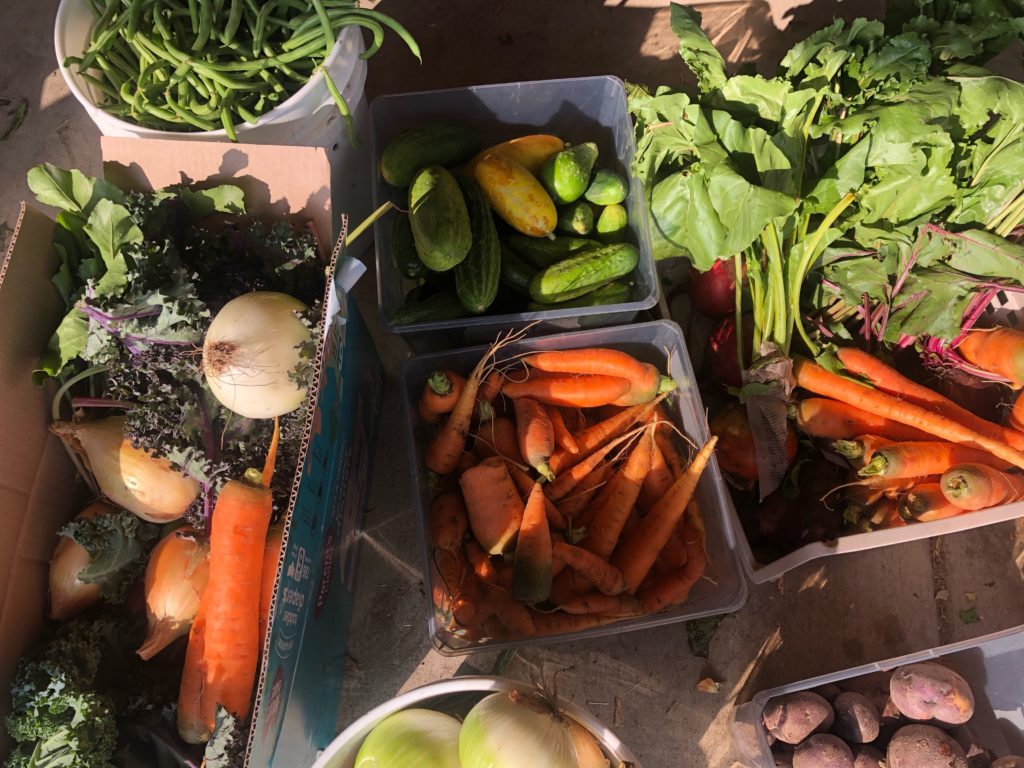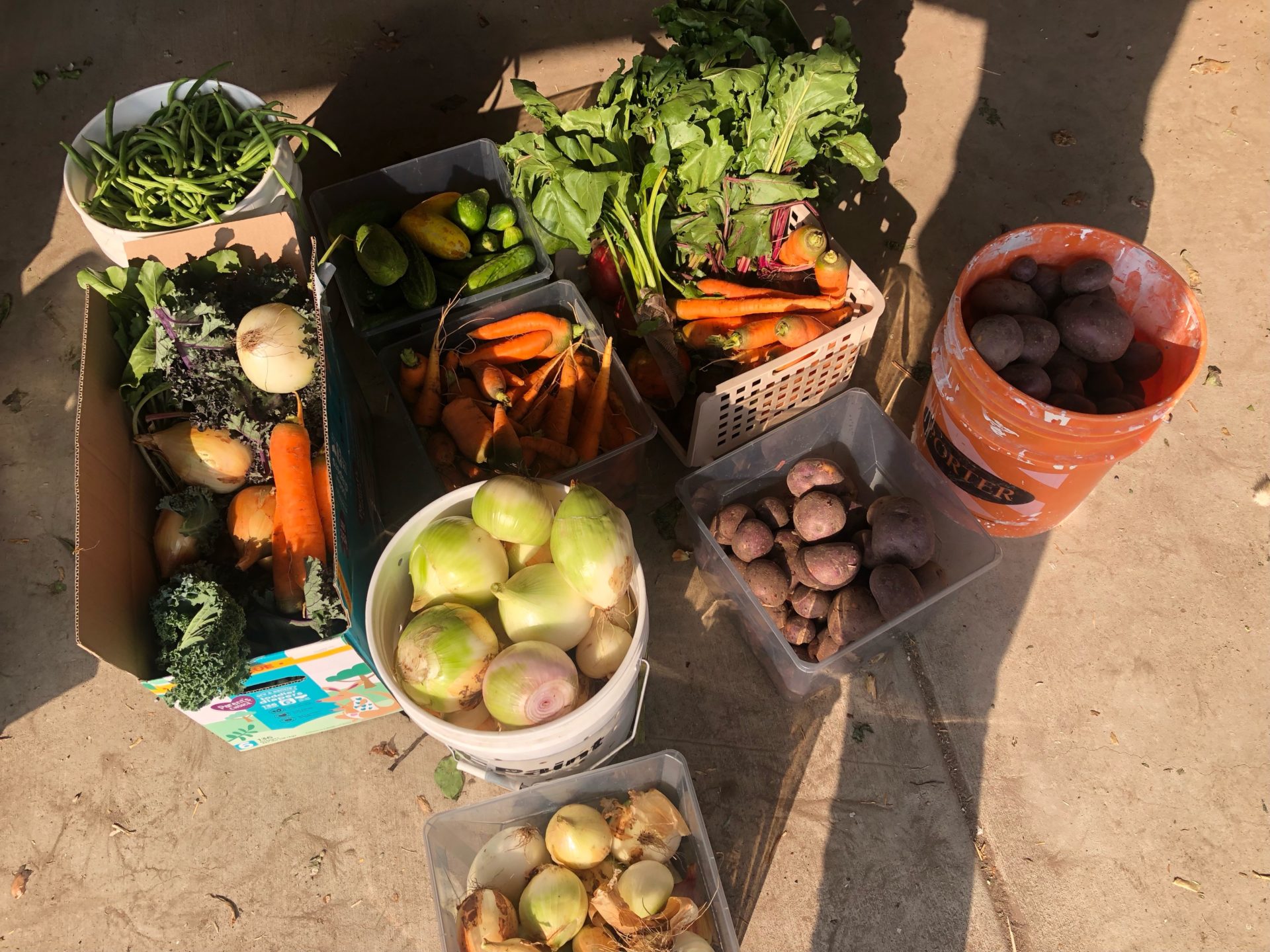She heads to her garden most days during the summer. Wearing a flowy dress that falls to the ground and sandals, she kicks her shoes off, opting instead for the feeling of dirt on her bare feet. Around her are rows of growing corn, potatoes, onions, and hearty greens, and in the distance lie majestic vistas of the surrounding foothills.
This scene was commonplace this past summer at community garden plots around Missoula. Thanks to the generosity of Garden City Harvest and Tower Gardens Community Garden at FARM, 11 refugees – mostly Congolese and Afghan community members plus one family from Myanmar – were able to farm their own land, planting ingredients common in their home country’s cooking and giving them a taste of home.
Here at Soft Landing Missoula, we believe food is one of the most powerful tools for connection, and that’s especially true for refugees coming from countries where subsistence farming wasn’t a hobby but rather a way of life. We have found that facilitating the opportunity for these families to grow their own food and prepare culturally appropriate meals gives many of them a sense of purpose, and it creates such joy.
For many Congolese farmers, this was not their first growing season. As the years have gone by, we’ve seen them get creative with the types of ingredients they’ll use and learn how to adjust their farming practices to match Missoula’s unique growing season – May to October, relatively short by comparison – and climate.
They loved growing corn, potatoes, leeks, onions, tomatoes, beans and something called lenga lenga, or pigweed as it’s known in English. Some of them have kept seeds from previous years.

This was the first growing season for Afghan farmers, as just about all of them have arrived since August 2021, and they told us they found a climate very similar to their home country here in Missoula. They were especially excited about onions, carrots, corn, cabbage and beans.
Greta Bates, a Soft Landing Missoula employee who oversees the summer food program, said the farmers would go every day because they have to water given Missoula’s dry conditions. “It’s amazing how they commit to it. There are mothers spending so much time on these plots despite working full-time, feeding the family, raising kids,” she said. “They do love it.”
None of this would have been possible without generous donations from community partners.
Garden City Harvest, a nonprofit in Missoula that does great work in the food sovereignty space, among other things, offers an income-based scholarship program to all residents. We supported clients in that application process and allocated funding for some of the cost, but Garden City Harvest provided meaningful scholarships to many refugee farmers so they could access the plots. The Community Food and Agriculture Coalition, which works to expand local farming opportunities, paid for the community garden plots at Tower Roads. Seedlings 4 Solidarity, an anti-hunger mutual aid organization, provided seed starters which can be extraordinarily expensive, but are required for many crops in Missoula with our short growing season.
Soft Landing Missoula’s food program also included a weekly CSA pickup – a huge benefit to refugee and immigrant community members who rely on fresh produce but often struggle to access it.
This was our third year working in partnership with Garden City Harvest, this time with the team over at their River Road Farm (shout-out to Greg Price who oversaw the growing and donations at the farm!).
Every Friday for 18 weeks between June and October, a Soft Landing staff member would pick up produce from the River Road CSA booth – an assortment of leftover items that had not been collected by CSA members as well as specific items that Greg had grown more of because he knows they’re popular among refugee community members – and drop it off at a couple locations where women could do their own shopping, so to speak.
The biggest pickup would be at Little Twigs, a local childcare facility that serves 50 children between the ages of 0 and 6-years-old and is staffed almost entirely by refugee women who are able to work on professional development, leadership training and English language skills. This summer, Little Twigs employed 15 refugee women as childcare providers.
Many of these women would avail themselves of the weekly CSA produce.
Onions always went, especially among the Afghan women, as did cucumbers. Basil was surprisingly popular – the Afghan women use it to make potpourri while Congolese women use it medicinally.
At first, kale wasn’t a huge hit, but some of the Congolese started to use it for stews. And while green beans were coveted by all, kohlrabi and garlic scapes took a little bit of coaching on how to incorporate into traditional dishes from the Congo or Afghanistan.

Garden City Harvest provided over 2,000 pounds of produce this summer – a staggering number that included a huge diversity of vegetables, herbs and other items. We owe them a HUGE thank you!
Soft Landing’s summer food program creates tremendous joy, but we believe it’s also essential to the emotional and mental health and wellness of refugee and immigrant community members we serve.
Research overwhelmingly that reliable access to culturally appropriate food promotes mental health and physical wellbeing. One 2021 study from the journal Food Security concluded that “Inadequate access to cultural foods can create cultural stress and affect one’s identity and well-being.” Another study, published in 2020, found that sharing food culture helps people make sense of and maintain their own self identity in multicultural communities, supporting mental health in the process.
Additionally, we all know that a diet rich in nutrients and fresh food is important; however, the cost of food has skyrocketed in this macroeconomic environment. According to the U.S. Bureau of Labor Statistics, the cost of food between April 2021 and April 2022 rose by 10.8%, the largest increase since the same time period ending November 1980.
As an organization that strives to create an environment where refugees and immigrants can integrate and thrive in Missoula, we believe our food program helps meet an essential need – feeding a family. It also feeds another kind of need – the desire of many refugee and immigrant community members to feel connected to their home countries and their cultural traditions so that they can be the truest and fullest versions of themselves in their new home here in Missoula.

